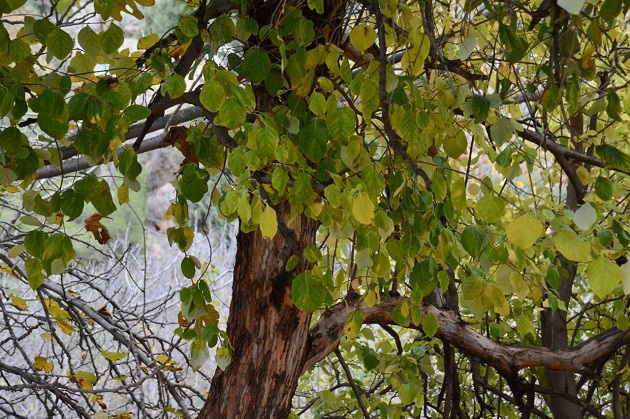Resins are organic secretions produced by many plants with the aim of providing a natural protection against insects, fungi and other pests.
 Storax is a balm obtained from the resin of the Styrax officinale tree, as seen in this photo taken to the north of the Sea of Galilee. / Photo: Antonio Cruz
Storax is a balm obtained from the resin of the Styrax officinale tree, as seen in this photo taken to the north of the Sea of Galilee. / Photo: Antonio Cruz
Then the Lord said to Moses, “Take fragrant spices—gum resin, onycha and galbanum—and pure frankincense, all in equal amounts”. (Ex. 30:34)
The term ‘gum resin’ only appears once in the Bible, in the book of Exodos 30:34. The Hebrew word is nataph, and is used to refer to one of the ingredients of the incense that was burnt in Solomon’s temple. It means “oozing substance”. This incense, the formula for which forms part of the prayer of Ketoret, was used exclusively for religious purposes in honour of Yaweh, and the penalty for using it wrongly, for non-religious purposes, was exile or expulsion from the community (Exodus 30: 34-38).
Traditionally it has been considered a fragrant vegetal resin, as the rabbi Rabban Shimon ben Gamaliel, a contemporary of Jesus, wrote, ”Gum resin is simply the sap that drips from the balm tree when it is struck.” (Kerithot 6a). However, it is not entirely certain which plant this resin comes from. Several possibilities have been suggested: nataph is a very pure extract from the myrrh tree (Commiphora myrrha), or perhaps it is the light resin that this tree naturally exudes before harvest; or it might be myrrh perfumed with “storax” or “benzoin”, resins that are obtained from the trunk of certain trees (Styrax officinalis y Styrax benzoin respectively); or maybe it is the resin from the tree known as the balm of Mecca (Commiphora opobalsamun), often referred to in ancient Jewish writings as “”Balm”.
 Photo: Antonio Cruz.
Photo: Antonio Cruz.Resins are organic secretions produced by many plants with the aim of providing a natural protection against insects, fungi and other pests. Some of them are greatly appreciated for their chemical properties, which make them an ideal source of substances such as varnish, adhesives, food, perfumes or incense
Charles Spurgeon wrote the following words: “In all our public service the rendering of thanks must abound; it is like the incense of the temple, which filled the whole house with smoke. Expiatory sacrifices are ended, but those of gratitude will never be out of date. So long as we are receivers of mercy, we must be givers of thanks. Mercy permits us to enter his gates; let us praise that mercy. What better subject for our thoughts in God's own house than the Lord of the house”. [1]
[1] http://www.romans45.org/spurgeon/treasury/ps100.htm

Las opiniones vertidas por nuestros colaboradores se realizan a nivel personal, pudiendo coincidir o no con la postura de la dirección de Protestante Digital.
Si quieres comentar o